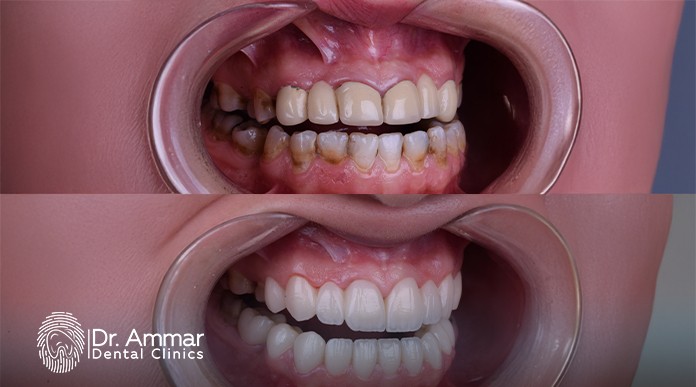Causes of Gum Inflammation
The gums are the supporting tissue of the teeth that surrounds them, and they may be exposed to many health problems that affect their function. One of the most common of these problems is gingivitis, which severely affects the gums. Indeed, there are many causes of gingivitis, whether in adults or in children. It is extremely important to treat this problem before it leads to many serious complications that may eventually result in the loss of teeth.
It is important to know the causes of gingivitis in children and adults, because avoiding these causes will help in preventing or treating the problem. Therefore, in this article, we will discuss the causes of gingivitis and its treatment with one of the best dentists in Egypt, Dr. Ammar – Specialist in Dentistry and Cosmetic Dentistry. Keep reading this article to the end to learn all the details.
What is gingivitis?
Before talking about the causes of severe gingivitis, let us define gingivitis. Gingivitis is one of the diseases that affect the gums and lead to redness, irritation, and bleeding. Gingivitis results from the accumulation of bacteria in the mouth due to neglecting proper dental hygiene, including regular brushing with toothpaste and flossing.
Gingivitis itself is not a serious disease and can be easily treated. However, if left untreated, it can lead to more serious problems such as periodontitis, which eventually causes tooth loss.
Therefore, in the following sections, we will learn about the causes of gingivitis and its treatment.
What are the causes of gingivitis?
There are many questions regarding the causes of gingivitis and its treatment, as well as the causes of gingivitis and swelling. It should be noted that the main reason behind this condition is the lack of proper oral hygiene, which leads to plaque accumulation on the teeth. Then tartar forms, which causes bacteria to accumulate at the gum line. Eventually, this bacterial buildup irritates the gums and causes gingivitis. However, there are other factors that increase the risk of infection. The causes of recurrent gingivitis may include:
-
Neglecting oral hygiene: Not brushing and cleaning teeth regularly is the most common cause of gingivitis. The mouth must be cleaned twice daily using a fluoride toothpaste.
-
Hormonal changes: Hormonal changes, such as those during pregnancy or adolescence, affect gum health.
-
Dental problems: Crooked or crowded teeth can cause gingivitis due to food trapping between teeth.
-
Smoking: Smoking is a major risk factor for gingivitis.
-
Chronic diseases: Conditions such as diabetes, immune deficiencies, and cancers increase the risk of gingivitis.
-
Poor nutrition: An unbalanced diet and deficiencies in vitamins and minerals, such as vitamin C, weaken gum health.
-
Genetic factors: Some people may have a genetic predisposition to gum disease.
-
Certain medications: Some medications may have side effects that cause gingivitis.
-
Improper dental restorations: Poor dental restorations negatively affect oral and gum health.
-
Aging.
-
Stress.
All the above causes of severe gingivitis increase the risk in adults. However, there are also causes of gingivitis in children, which include:
-
Neglecting oral hygiene: Not brushing properly leads to gingivitis.
-
Unhealthy diet: Eating foods high in sugar increases the risk of gingivitis.
-
Bad habits: Such as nail-biting or using teeth to open containers.
-
Hormonal changes: Some hormonal changes during adolescence may lead to gingivitis.
-
Genetic factors.
The causes of gingivitis in children can be avoided by teaching them from a young age how to care for their teeth, brush properly, and maintain consistent oral hygiene. All the above reasons fall under the list of causes of gingivitis and swelling, as gingivitis often leads to gum swelling.
How is gingivitis diagnosed?
The causes of gingivitis play a role in its diagnosis. To diagnose gingivitis, the doctor will:
-
Ask the patient about the symptoms.
-
Examine the mouth and teeth to identify any signs of gingivitis.
-
Examine the teeth using special tools such as probing periodontal pockets.
-
Use dental X-rays to check the bones and surrounding tissues.
How long does it take to treat gingivitis?
After learning about the causes of recurrent gingivitis and its causes in children, many look for treatment methods. Treatment usually includes:
-
Antibiotics.
-
Deep dental cleaning.
-
Consistent oral hygiene.
The treatment duration is usually very short. Once the gums are cleaned, the inflammation begins to heal within 7 to 14 days, though this may vary from case to case.
It is important to know the causes of recurrent gingivitis and treat them, because addressing the underlying causes helps prevent the condition in the first place, possibly eliminating the need for treatment later.
Is gum swelling dangerous?
Gum swelling caused by gingivitis itself is not dangerous and does not lead to serious complications if the patient consults the right doctor and treats the problem quickly. However, if treatment is neglected, the condition can progress and eventually lead to many serious complications.
Complications of gingivitis
After learning about the causes of gingivitis and swelling, it should be noted that gingivitis can result in many serious complications, including:
-
Gum abscesses that may extend to the jawbone.
-
Recurrent gingivitis.
-
Gum ulcers.
-
Periodontitis, which causes jawbone damage.
-
Gum recession.
Therefore, it is extremely important to know gingivitis and its treatment to avoid these serious complications. It is necessary to consult the best doctors, such as Dr. Ammar – Specialist in Dentistry and Cosmetic Dentistry – to treat this condition with precision.
Prevention of gingivitis
There are several methods to prevent gingivitis, including:
-
Brushing teeth: Use a toothbrush and toothpaste twice daily.
-
Flossing: Use dental floss daily to remove plaque between teeth and in hard-to-reach areas.
-
Quitting smoking: Reduces the risk of gingivitis.
-
Using antibacterial mouthwash: Helps reduce plaque and bacteria that cause gingivitis.
-
Eating a balanced diet rich in vitamins and minerals, such as vitamin C: Enhances gum health and prevents gingivitis. Avoid foods and drinks high in sugar.
-
Visiting the dentist regularly: For checkups and professional cleanings, as dentists can remove tartar and plaque buildup on the teeth and gums.
See before and after cases with Dr. Ammar
In conclusion, there are many causes of gingivitis. However, the most important thing is to choose the best doctors for treatment and maintain consistent oral hygiene. Therefore, do not hesitate to contact Dr. Ammar’s clinics – Specialist in Dentistry and Cosmetic Dentistry – to get rid of this problem in the best possible way.

